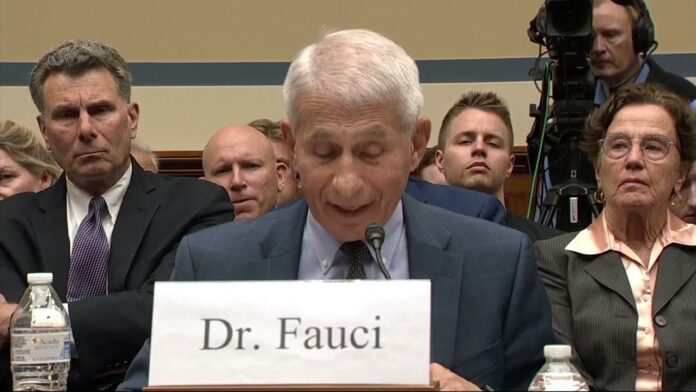Dr Anthony Fauci testifies before congress, addressing his COVID-19 pandemic response and theories about the virus’s origins
Dr. Anthony Fauci, former director of the National Institute of Allergy and Infectious Diseases, defended his pandemic-era decisions in a contentious congressional hearing on Monday. Fauci, 83, faced rigorous questioning from House Republicans about his role during COVID-19, which claimed over a million American lives. This marked his first appearance before Congress since leaving government service in 2022.
Fauci maintained that he did not use personal email for official business, countering allegations of avoiding oversight. He emphasized his openness to various theories about the virus’s origins, including the possibility of a lab-related incident. He reiterated, however, that the viruses studied at the Wuhan Institute of Virology under an NIH subgrant could not have caused COVID-19.
“I have always kept an open mind regarding the origins of the virus,” Fauci told the Select Subcommittee on the Coronavirus Pandemic. He stressed that scientific guidance evolved as new information emerged during the early months of the outbreak. “When dealing with a new outbreak, things change,” he explained. “The scientific process gathers information to inform guidelines and recommendations.”
Republicans questioned Fauci about U.S. government grants to the Wuhan Institute and whether the lab could have created COVID-19. Fauci refuted these claims, stating the NIH-funded research focused on potential emerging infections and was not dangerous gain-of-function research. He noted the $120,000 subgrant to Wuhan was a small fraction of the budget.
“The viruses funded by the NIH could not have been the precursor to SARS-CoV-2,” Fauci stated. “If anything untoward was happening in China, it was not due to this grant.” He pointed out that a small NIH grant was unlikely to fund any clandestine activities.
Fauci also defended the early public health measures, including social distancing, mask-wearing, and the vaccine rollout. “Had we not taken these steps, another million people might have died,” he asserted. He clarified that initial vaccine data suggested it prevented infection and transmission, but over time it became clear that protection against severe disease, hospitalization, and death was more durable.
Republicans also accused Fauci of using personal email to evade Freedom of Information Act requests. Fauci vehemently denied these accusations, stating, “I never conducted official business using my personal email.”
The hearing highlighted the intense scrutiny Fauci has faced, including death threats. Rep. Debbie Dingell, a Michigan Democrat, inquired about the threats against Fauci and his family. Fauci confirmed receiving credible death threats, resulting in the arrests of two individuals. “These threats required constant protective services,” he said.
The session became heated when Rep. Marjorie Taylor Greene refused to address Fauci as a medical doctor, calling him “Mr. Fauci” and alleging he should be jailed. No evidence of any crimes was presented, nor have any law enforcement agencies charged Fauci.
Rep. Jamie Raskin, the ranking Democrat on the Committee on Oversight and Accountability, defended Fauci’s career, saying he has dedicated his life to public health. Raskin criticized GOP lawmakers for treating Fauci like a “convicted felon” and seemingly referenced former President Donald Trump, noting that some lawmakers “blindly worship convicted felons.”
Analysis
Dr. Fauci’s testimony underscores the complex and contentious nature of the COVID-19 pandemic response and the ongoing debate about the virus’s origins. His defence of evolving guidelines reflects the scientific community’s need to adapt as new data emerges, a fundamental aspect of managing unprecedented health crises.
From a political perspective, the hearing highlights the deep partisan divide over the handling of the pandemic. Republicans used the opportunity to challenge Fauci’s decisions and the transparency of his actions, reflecting broader concerns about government accountability. On the other hand, Democrats defended Fauci’s integrity and commitment to public health, emphasizing the unprecedented challenges he faced.
Economically, the scrutiny of NIH grants to the Wuhan Institute of Virology points to broader concerns about the allocation of public funds for scientific research. The debate over gain-of-function research, with its shifting definitions, further complicates discussions about the safety and ethics of funding potentially risky studies.
Sociologically, the hearing sheds light on public perceptions of scientific authority and trust in government officials. Fauci’s acknowledgement of death threats highlights the personal risks faced by public health figures during crises, exacerbated by misinformation and political polarization.
The issue of email use and transparency raises important questions about government oversight and the mechanisms in place to ensure accountability. Allegations of using personal email to evade FOIA requests point to a need for clearer guidelines and stricter enforcement of transparency protocols.
In terms of public health, Fauci’s testimony reinforces the importance of adaptive, evidence-based guidelines. The initial belief that vaccines would prevent infection and transmission, followed by later findings of their limited durability in this regard, illustrates the dynamic nature of scientific understanding and communication challenges.
In conclusion, Fauci’s defence and the subsequent political reactions underscore the complexities of managing a global health crisis. The hearing reflects broader societal debates about scientific authority, government transparency, and the interplay between politics and public health. As the world continues to navigate the aftermath of COVID-19, these discussions will remain critical in shaping future responses to similar crises.
